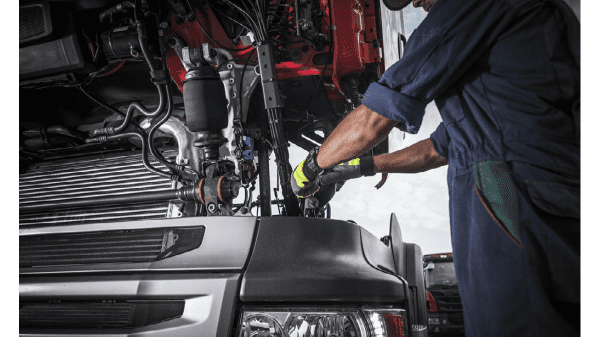For this transportation-themed series, Blueprints hosted a roundtable discussion of crucial issues affecting the sector. Learn what our panel of nine experts had to say, as they offer their perspectives and weigh in on key issues and more.
CHALLENGE #5: SERVICE, MAINTENANCE, AND TECHNICIANS
Trucks won’t run without the proper parts, and disruptions in the supply chain have caused a crisis in service and maintenance.
Even with peaking demand, only 60 percent of open port slots are filled because of a lack of optimally performing vehicles—and, to make matters worse, there’s a lack of qualified technicians to perform maintenance.
This issue made the American Trucking Research Institute list for the first time, coming in at tenth, where it will likely climb in the coming years as the demand for qualified technicians is expected to grow by 12 percent over the next two years.
What’s worse is as many as 75,000 technicians are needed to replace those who are retiring, and schools are turning out only 3,500 per year.
Jason Furman, president and COO, Sunbelt Logistics Group BB #:135767 in Mississauga, ON
There’s an inability for trucking companies to take deliveries of new equipment on order, and a replacement parts issue as well, due to the microchip shortage.
This has driven the cost of new equipment to record highs and fueled the used market, increasing operating costs dramatically. There’s no good news on the horizon that will see any of these supply challenges improve.
Mike Laws, founder and president of Laws Logistics in Naples, FL
The biggest issue facing the industry right now is the lack of collaboration between supply chain stakeholders. In recent years, relationships between customers and providers has become more about negotiation and less about cooperation.
Supply chains become more efficient when information and metrics are regularly shared and updated between parties.
Michelle Lewis, manager, Sparky’s Transportation Corporation BB #:170030 in Clarks Summit, PA
One of the biggest issues transportation is facing today is lack of capacity. During the pandemic, smaller trucking companies folded because there were very few technicians, and others decided to stay home due to stimulus packages and increased unemployment benefits.
Larger companies had mass layoffs, and many of these companies have not been able to get the equipment back up to prepandemic levels. The wait times for parts to fix a new truck have exhausted some of the carriers, because all they can do is wait.
Ted Prince, COO and EVP for planning, Tiger Cool Express, LLC BB #:290720 in Overland Park, KS
The only thing harder to find than a driver is a mechanic, and the only thing harder than that is a diesel mechanic.
Now that’s a career path for 18- and 20-year-olds! You don’t need a four-year college degree to do this work. We should be improving the path to apprenticeship, which is what junior colleges are about. It generates good jobs and less debt.
This is an excerpt from the Transportation & Logistics supplement to the July/August 2022 issue of Produce Blueprints Magazine. Click here to read the whole supplement.



